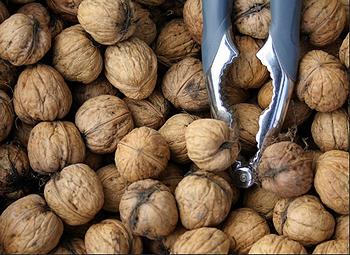
LOMA LINDA, California, January 28, 2020 (ENS) – Eating walnuts may help slow cognitive decline in at-risk groups of elderly people, according to a study conducted by researchers in California and Spain. Walnuts contain omega-3 fatty acids and polyphenols, which have been found to counteract oxidative stress and inflammation, both of which are drivers of cognitive decline.
The “Walnuts and Healthy Aging Study,” published in this month’s issue of “The American Journal of Clinical Nutrition,” found that walnut consumption by healthy, elderly adults had little effect on cognitive function over two years, but it had greater effect on elderly adults who had smoked more and had lower baseline neuropsychological test scores.

The study examined nearly 640 free-living elders in Loma Linda, California and in Barcelona, Catalonia, Spain. Half of the participants were assigned to a group that received a serving of walnuts in their diets each day for two years. The other half, the control group, refrained from eating walnuts for the same time period.
Joan Sabaté, MD, DrPH, professor of nutrition and epidemiology at Loma Linda University School of Public Health and the study’s principal investigator, said this was the largest and best-controlled trial ever conducted on the effects of nuts on cognition.
“While this was a minor result, it could lead to better outcomes when conducted over longer periods of time,” Dr. Sabaté said.
The study was conducted at two locations, Loma Linda University in the United States and University Hospital Clinic Barcelona Spain. Each study site recruited 350 healthy elderly subjects who made a two-year commitment to participate in the study. Recruitment began in September of 2012 and continued until 2013.
Eligible participants were between the ages of 62 to 80 years old, reasonably healthy, and able to read and write English. They were not extremely obese, they did not have uncontrolled diabetes or hypertension, they were not in the first year of tragic loss, nor were they allergic to walnuts.
Memory tests and eye exams were administered to the participants. Blood was drawn to test their general health parameters. Every two months each participant came to Loma Linda University to be weighed and measured and to meet with the study dietitian. During this visit walnuts were provided to those in the walnut group while other incentives were given to those in the control group. At the end of one year blood draw was conducted and at the end of two years memory tests and eye and final blood draw were conducted.

This was the first large study to test whether or not walnuts play a part in healthy aging, particularly with regard to cognition, eye health, inflammation, risk factors for heart disease and nutritional status.
Dr. Sabaté said, “Further investigation is definitely warranted based on our findings, especially for disadvantaged populations, who may have the most to gain from incorporating walnuts and other nuts into their diet.”
Twenty-seven years ago, Sabaté and his research team at Loma Linda University were the first to discover the blood cholesterol-lowering effect of nut consumption – specifically walnuts. These findings were first published in the “New England Journal of Medicine” in 1993.
Subsequently, findings from Loma Linda University researchers have linked nut consumption to lower risk of cardiovascular diseases.
Bringing the research full circle Archives of Internal Medicine has recently published the findings of Dr. Sabaté’s pooled analysis of 25 intervention trials establishing the benefits of nut consumption on blood lipid levels and lowering the risk of heart disease.
Dr. Sabaté continues to research the relationship of almonds, pecans, and walnuts to health outcomes.
The “Walnuts and Healthy Aging Study” was funded by a grant from the California Walnut Commission, which had no input in the study design, data collection, analyses, or writing and submission of the manuscript.
Copyright Environment News Service (ENS) 2020. All rights reserved.
